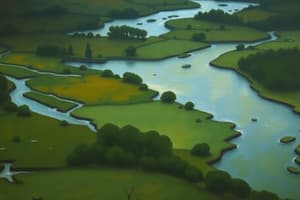Podcast
Questions and Answers
Define a drainage basin.
Define a drainage basin.
A drainage basin is the entire area drained by a stream and its tributaries.
Where in drainage basins does sediment tend to be deposited? (Select all that apply)
Where in drainage basins does sediment tend to be deposited? (Select all that apply)
- On hilltops
- Deltas (correct)
- Oceans (correct)
- Relatively flat lowlands (correct)
Where in drainage basins does sediment most likely originate? (Select all that apply)
Where in drainage basins does sediment most likely originate? (Select all that apply)
- Landslides (correct)
- Deserts
- Upland erosion (correct)
- Tributaries (correct)
Describe the difference between open and closed drainage basins.
Describe the difference between open and closed drainage basins.
In what climate and tectonic setting are you most likely to find closed drainage basins?
In what climate and tectonic setting are you most likely to find closed drainage basins?
Describe three specific challenges geomorphologists face in creating a sediment budget.
Describe three specific challenges geomorphologists face in creating a sediment budget.
Define a sediment rating curve and describe how sediment rating curves are created.
Define a sediment rating curve and describe how sediment rating curves are created.
Explain why data in sediment rating curves are so variable.
Explain why data in sediment rating curves are so variable.
What are four common types of drainage patterns?
What are four common types of drainage patterns?
Explain the factors leading to each of the four common drainage patterns.
Explain the factors leading to each of the four common drainage patterns.
Flashcards are hidden until you start studying
Study Notes
Drainage Basin Overview
- A drainage basin is an area drained by a stream and its tributaries, facilitating water and sediment movement down topographic gradients.
Sediment Deposition
- Sediment primarily deposits in flat lowlands, oceans, and deltas.
- Depositional locations:
- Colluvium at hillslope bases (50%)
- Valley-bottom terraces (30%)
- River mouths (20%)
Sediment Origin
- Sediment originates mainly from upland (hillslope) erosion (70%).
- Additional sources include tributaries (20%) and landslides (10%).
Open vs. Closed Drainage Basins
- Open drainage basins transport mass (water, sediment, dissolved load) to larger watersheds or oceans.
- Closed drainage basins are internally drained, losing water through evaporation and groundwater seepage, common in lowlands.
Locations of Closed Drainage Basins
- Common in arid regions with poorly developed drainage and extensional tectonic settings.
- Also found in glaciated areas with overdeepened valleys.
- Examples include the Great Salt Lake and the Dead Sea.
Challenges in Sediment Budgeting
- Temporal variability complicates erosion process estimations, as events like landslides occur episodically.
- Difficulty in estimating sediment volume stored in floodplains, terraces, and fans.
- Challenges in dating landforms and sediment.
Sediment Rating Curve
- A sediment rating curve relates sediment discharge to water discharge.
- Created by plotting water discharge (m³/sec) against sediment discharge (kg/sec) during varied flow events.
Variability in Sediment Rating Curves
- Data in sediment rating curves show high variability due to fluctuations in sediment discharge over time.
Common Drainage Patterns
- Dendritic Pattern: Treelike tributary system, formed in flat-lying sediments or homogeneous rocks.
- Trellis Pattern: Characterized by two channel orientations at right angles; develops in tilted/folded sedimentary rocks.
- Rectangular Pattern: More symmetric than trellis, formed by jointing or faults in landscapes with carbonate rocks.
- Radial Pattern: Channels radiate from a central point, often associated with symmetrical landforms like volcanoes.
Factors Influencing Drainage Patterns
- Dendritic: Absence of structural or lithologic controls leads to branching systems.
- Trellis and Rectangular: Governed by geological structures and resistance of different rock layers affecting erosion rates.
Studying That Suits You
Use AI to generate personalized quizzes and flashcards to suit your learning preferences.




